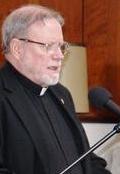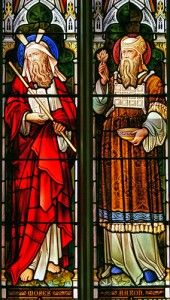by Fr. Patrick Henry Reardon
 Senior Editor of Touchstone Magazine, and archpriest of All Saints Orthodox Church in Chicago, IL, Fr. Patrick is, perhaps, the most erudite writer in the Orthodox Church in North America today. This article, one of his Pastoral Ponderings, was published by Orthodoxtoday.org.
Senior Editor of Touchstone Magazine, and archpriest of All Saints Orthodox Church in Chicago, IL, Fr. Patrick is, perhaps, the most erudite writer in the Orthodox Church in North America today. This article, one of his Pastoral Ponderings, was published by Orthodoxtoday.org.
Two parallel scenes in the Pentateuch indicate the spiritual growth of Aaron over the years of Israel’s desert wandering. Standing in opposition to one another in the general structure of the Torah, each scene also contains further elements of internal contrast.
The earlier story is preserved in Exodus 32, which describes the incident of the golden calf. Aaron, in that episode, appears as a craven and double-minded hireling, and no shepherd. At the people’s first idolatrous impulse, in fact, he accedes to their wishes, telling them to hand over their jewelry, which he then uses to construct a molded calf.
 Although very involved in the people’s sin, Aaron never admits his association in their guilt. He becomes, rather, a classical example of a sinner rationalizing an infidelity, pretending his is not an act of apostasy, but an example (as the saying goes) of “accepting people where they are.” Aaron does not love them enough to resist them.
Although very involved in the people’s sin, Aaron never admits his association in their guilt. He becomes, rather, a classical example of a sinner rationalizing an infidelity, pretending his is not an act of apostasy, but an example (as the saying goes) of “accepting people where they are.” Aaron does not love them enough to resist them.
Then, taken to task by his brother for this complicity, Aaron shamelessly denies his fault. “You know the people,” he tells Moses, “they are set on evil.” In a line of supreme mockery, the cowardly Aaron tries to minimize his involvement by claiming, “I cast [the gold] into the fire, and this calf came out.” He is portrayed as a truly unsuitable priest.
Within the structure of this story, furthermore, Aaron is dramatically contrasted with Moses: At the very moment he is down in the valley, enabling the infidelity of the Israelites, faithful Moses stands on top of the mountain, praying the Lord to spare His people. The prayer of Moses prevails.
There is an additional irony in this contrast between Moses and Aaron: At the time the restless Israelites in the valley had been plotting their rebellion, Moses had been receiving the Lord’s detailed instructions concerning Aaron’s priesthood (Exodus 28-31). That is to say, even as his priesthood was in the process of formation, Aaron already proved himself unqualified for it. Even as his vestments were being designed, he showed himself unworthy to wear them.
In pointed contrast to this early portrayal of Aaron stands a later scene in Numbers 16. In the latter case we find a much improved Aaron, who has now become a genuine high priest with
“compassion on those who are ignorant and going astray, since he himself is also subject to weakness” (Hebrews 5:2).
As the Israelites in the later scene are being punished by plague for their most recent rebellion — thousands of them dying in a single day — Aaron takes up his priestly censor and runs down among them, placing his body between the dead and the living, and
“making atonement for the people.”
The Sacred Text tells us,
“he stood between the dead and the living; so the plague was stopped.”
In this riveting scene, Aaron is not contrasted with Moses. On the contrary, the two brothers are now at one in their concern for the people. When the Lord tells them,
“Get away from among this congregation, that I may consume them in a moment,”
Moses and Aaron alike fall on their faces in joint intercessory prayer. In the earlier story, Moses had made that prayer alone, while his brother was being complicit in the people’s sin, but now the two brothers are in complete harmony.
The tension of the earlier story is resolved:
“So Aaron returned to Moses at the door of the tabernacle of meeting, for the plague had stopped.”
The internal contrast in this second account is, rather, between Aaron and a Levite named Korah. Forgetting that “no man takes this honor to himself, but he who is called by God, just as Aaron (Hebrews 5:4), Korah coveted the priestly office as a position of honor and power, both for himself and his household. So in the rebellion Korah and his family were the first to be punished:
“the ground split apart under them, and the earth opened its mouth and swallowed them up, with their households and all the men with Korah, with all their goods. So they and all those with them went down alive into the pit; the earth closed over them, and they perished from among the assembly.”
If we compare Korah’s sin with the earlier infidelity of Aaron, it appears to be far worse. Whereas Aaron’s had been the failing of a weak and unworthy man, Korah’s is the more terrible offense of malice, pride, and deliberate rebellion.
